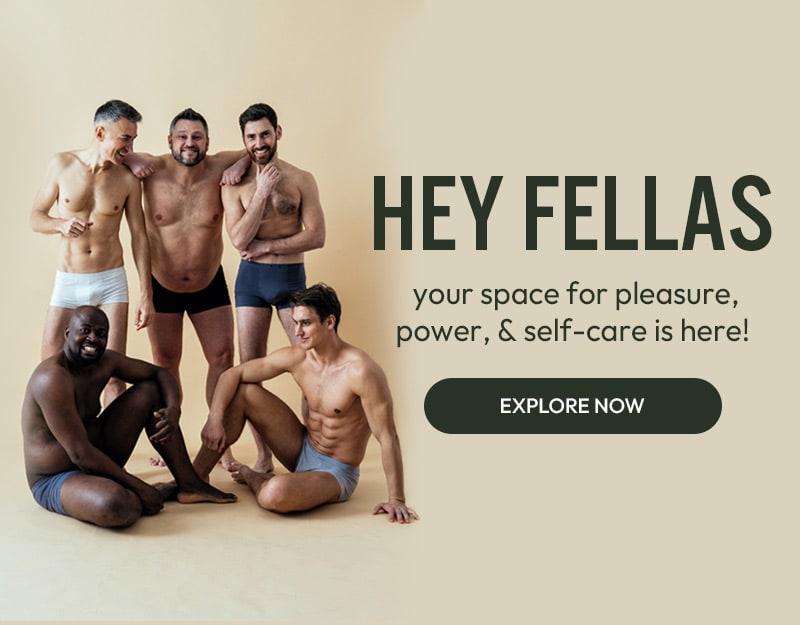Taking Care of Your Sexual Health in Non-Monogamous Relationships
Dabbling in non-monogamous relationships for the first time? As a married woman who has identified (and practiced) polyamory for over eight years now — who takes both her sexuality and sexual health very seriously! — there is one tip I give to anyone thinking of joining in the ethically non-monogamous lifestyle: always consider you and your partner(s) sexual health.
After all, polyamorous dating should be fun and safe! And what better way to do that than staying sexually safe? Other folks having sex in polyamorous relationships agree. According to one recent study, it was found that people in negotiated non-monogamy actually have fewer STIs and have transmitted to fewer partners than folks who haven’t been honest about their desires with all of their partners.
But how do you take care of yourself sexually in these alternative relationships? Should you share sex toys? How does polyamorous sex work? What is the best way to share your sex hygiene?
With the help of Dr. Ketan Parmar, a psychiatrist and sexologist, we’re here to give you everything you need to know about sexual health in alternative relationships, below:
What is polyamory vs non-monogamy?
If you’re new to the lifestyle of ethical non-monogamy, you might wonder: What is the difference between polyamory and non-monogamy?
Simply put, polyamory is having the ability to love multiple people at once — and often, having several serious romantic relationships — while non-monogamy is more of an umbrella term for things like: being in an open relationship, being polyamorous, swinging and more.
For example, I identify as polyamorous (I have the ability to love multiple people at once) but I am in an open relationship, and prefer to have my one primary partner, my husband.
Let’s put it another way. According to Dr. Parmar, polyamory specifically refers to relationships based on love and commitment, non-monogamy encompasses a broader range of arrangements, including open relationships and swinging.
What is sexual health?
If you’re considering any type of non-monogamous relationships, it’s important to be aware of what sexual health actually means, so you can make sure you’re staying in tip-top sexual safety.
“Sexual health is a fundamental aspect of overall well-being,” Dr. Parmar shares, “It encompasses not only physical health but also emotional, mental, and social well-being in relation to one’s sexuality. Being sexually healthy involves being free from sexually transmitted infections (STIs), having satisfying sexual experiences, and of course, being able to make informed decisions about sexuality.”
I know, when I started out in the lifestyle, that it became important to read up on STIs and get a refresh on how you can safely have sex (especially because sex education isn’t always taught to everyone!)
With only thirty nine states in the U.S., plus DC, having government mandated sex-education, only thirteen must provide “medically accurate” sex-education — making it all the more important to brush up on your education before just diving into group sex or double dildo fun.
What are good sexual health practices?
For folks in polyamorous or non-monogamous relationships, maintaining sexual health requires a proactive approach. It also largely depends on what you and your partner(s) decide is the healthiest routine for you.
For some folks who have one primary partner and one additional partner, your routine might vary, compared to someone with 8+ partners. No matter where you land on the non-monogamy spectrum though, good sexual health practices in non-monogamy require open communication, regular STI testing, safe sex practices, and above all, consent.
- Open Communication: Discussing sexual health concerns openly with partners creates a safe and supportive environment for addressing questions and concerns.
- Regular STI Testing: Getting tested regularly, especially when starting a new relationship, helps to identify and prevent the spread of STIs.
- Safe Sex Practices: Using condoms or other barriers during sexual activity is crucial for preventing the transmission of STIs and unwanted pregnancies.
- Consent: Ensuring that all parties involved are consenting to sexual activity is essential for a healthy and respectful relationship.
How can good sexual health practices apply to both polyamorous and non-monogamous individuals?
Here’s the thing: No matter if you’re polyamorous or non-monogamous, sexual health and safety practices still apply. They might just look a little different depending on your setup.
For me, my husband is my primary partner, but because I am polyamorous and we are in an open marriage, we both have other partners from time to time. Most of the time, these partners are pretty casual, but sometimes, they’re more meaningful. Either way, we have a rule in place that we get tested for STIs after each new partner, and we also ask folks about their testing status before any play happens. Once we’re comfortable with someone, and have engaged with them more than once, we generally don’t test every single time after. But that’s just our policy – you can choose your own, of course!
In non-monogamous situations, though, especially if you’re having a one-night fling or you’re at a sex party, I always recommend ample testing and open conversation before and after sex, using group sex toys and all the extra spicy stuff you might get up to.
How to have conversations about sexual health in relationships
Speaking of conversations around sexual health in relationships — this one can be so easy! Here’s my personal motto: If you (or a potential partner) don’t feel comfortable to have an open conversation about sexual health in relationships, you shouldn’t have sex with them.
If they are, however, then great! You can start by sharing your status, ask theirs and also ask about boundaries, sexual consent as well as protection measures, like using a condom or dental dam. It really can (and should) be that easy. We’re all adults here
How to share toys smartly (and safely!)
If you’re diving into non-monogamy for the first (or the millionth time,) you’ve had an open conversation about sexual health with your partner(s) and you feel ready to play, chances are, the potential of sharing sex toys might come up — especially sex toys for couples.
But should you share sex toys? Are couples sex toys safe to swap? The answer is yes! But can you get an std from sex toys? The answer is also yes. If you have sexual safety in mind, though, you can be prepared to have fun and stay safe.
“Sharing toys can be a fun and enjoyable aspect of non-monogamous relationships,” Dr. Parmar explains, “However, it's important to take precautions to prevent the transmission of STIs.”
To do so, we recommend:
1. Clean your sex toys regularly
Make sure you know how to clean sex toys. While you can buy sex toy cleaners made just for your fav vibrator or dildo, you can also do just as good of a job by washing them down with a mild soap and water after each use. This can help reduce the risk of bacterial or fungal infections.
2. Be mindful of sharing toys with partners who have STIs
If you’re non-monogamous or polyamorous, you may have multiple partners. So if you or your partner have an STI, avoid sharing toys to prevent transmission.
3. Use barrier protection
One of the best, and most effective ways to stay sexually safe, is by using protective barriers. Consider using condoms or other barriers when sharing toys to provide an additional layer of protection.
H4 4. Keep it slick
Plus, keep the play even more fun, and don’t forget the lube. Without lubrication, sex can be uncomfortable and irritating. With lube, you can avoid injury like wounds or fissures. Luckily, here at Good Vibes, we’ve got the best lube for sex and more.
Hayley Folk is a writer, editor and podcast host based in New York City. She writes about sex and relationships, the LGBTQ+ community, personal narratives and more. Her work has appeared in Refinery29, Women's Health Magazine, PS, Bustle, and more. Most often, she can be found on an airplane, thrifting, or writing in a coffee shop somewhere.

















